Abstract
STUDY OBJECTIVE--To describe the intra-subject variability of self reported maternal alcohol consumption using different ways of collecting information and to analyse the implications of this variability for research into the effect of low to moderate maternal alcohol consumption on birth weight. DESIGN--This was a longitudinal study. Self reported maternal alcohol consumption before, during, and after pregnancy was assessed on four occasions over two years. The data were collected by two self administered questionnaires and during two personal interviews (one by phone and another face to face). SETTINGS--The Obstetrics Department, Odense University Hospital, Odense, Fünen, Denmark. PARTICIPANTS--A total of 2880 pregnant women were recruited consecutively from the hospital catchment area. Altogether 328 pregnant women and their babies were selected. All women who reported an average alcohol consumption of five drinks or more per week were recruited to the study (164 women) and a 1:1 control group was selected from the remaining women based upon two matching criteria: expected date of delivery and the women's year of birth. Some 279 women (85%) completed the study. MEASUREMENTS AND MAIN RESULTS--Self reported alcohol consumption (number of drinks per week) and birth weight (g) were the main outcomes. Women's self reported alcohol consumption varied over time and according to the data collection method. When different methods of data collection were used to assess alcohol intake in similar periods of time, significant differences in reporting were found despite the relatively high correlations between the measurements. Although a consistent reduction in birth weight with increasing consumption of alcohol was found, there were differences in the shape and strength of this association when comparing the six available alcohol measurements. CONCLUSIONS--The type of questions used, the way the data were collected, the period of time referred to, and the time the questions were asked, should be taken into consideration when describing the drinking pattern of pregnant women. Furthermore, birth weight results from studies that have used different alcohol measures should be interpreted or compared with caution because of possible large differences resulting from the differing methods of assessing fetal exposure to alcohol.
Full text
PDF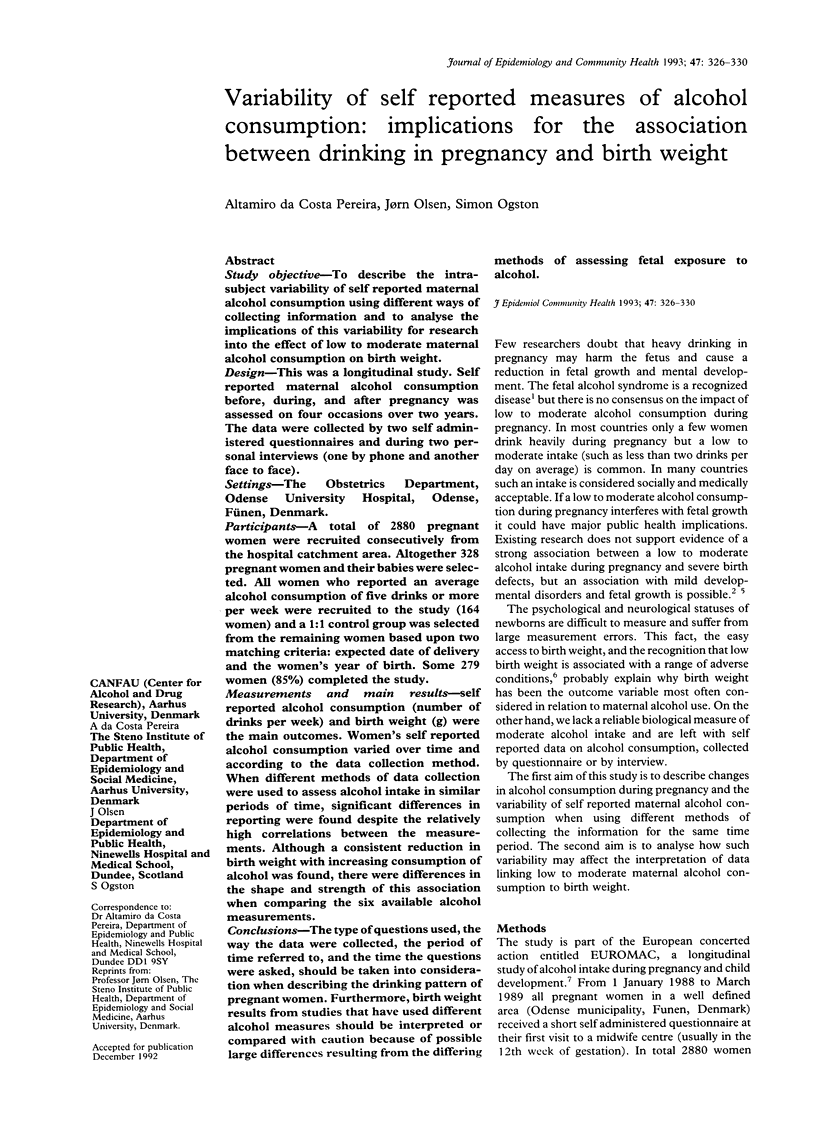
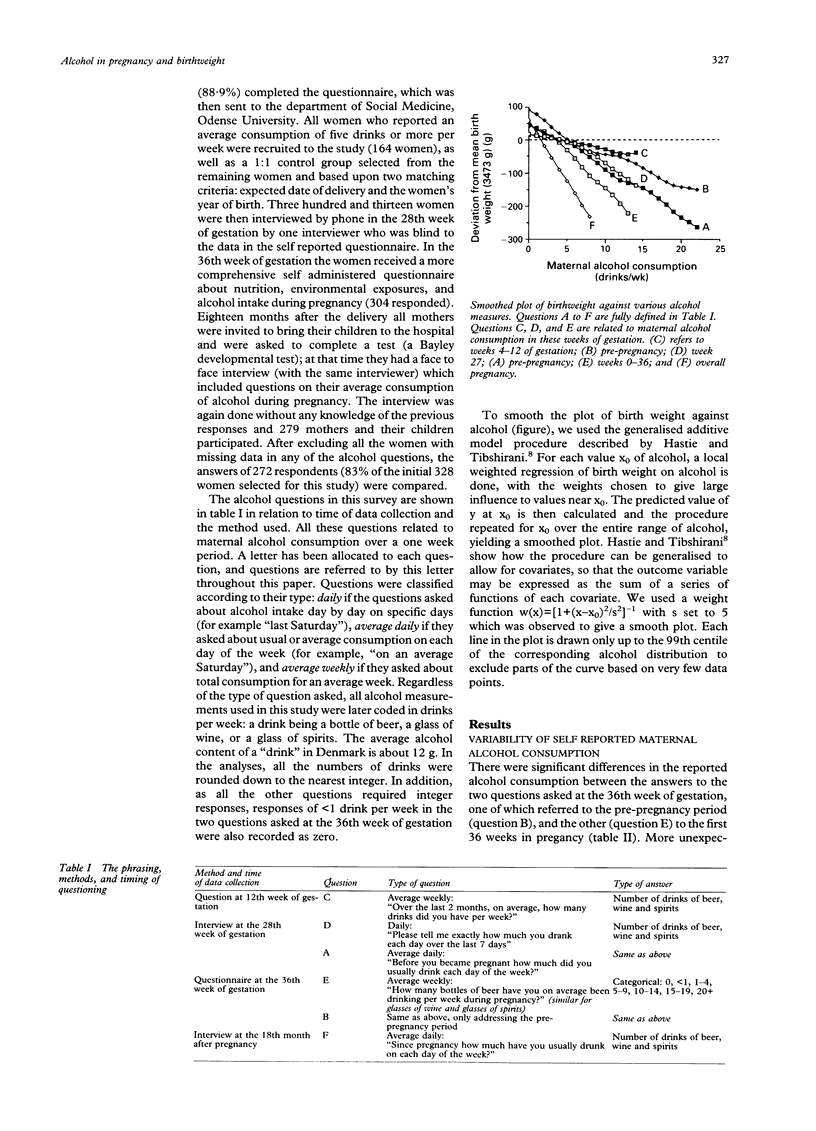
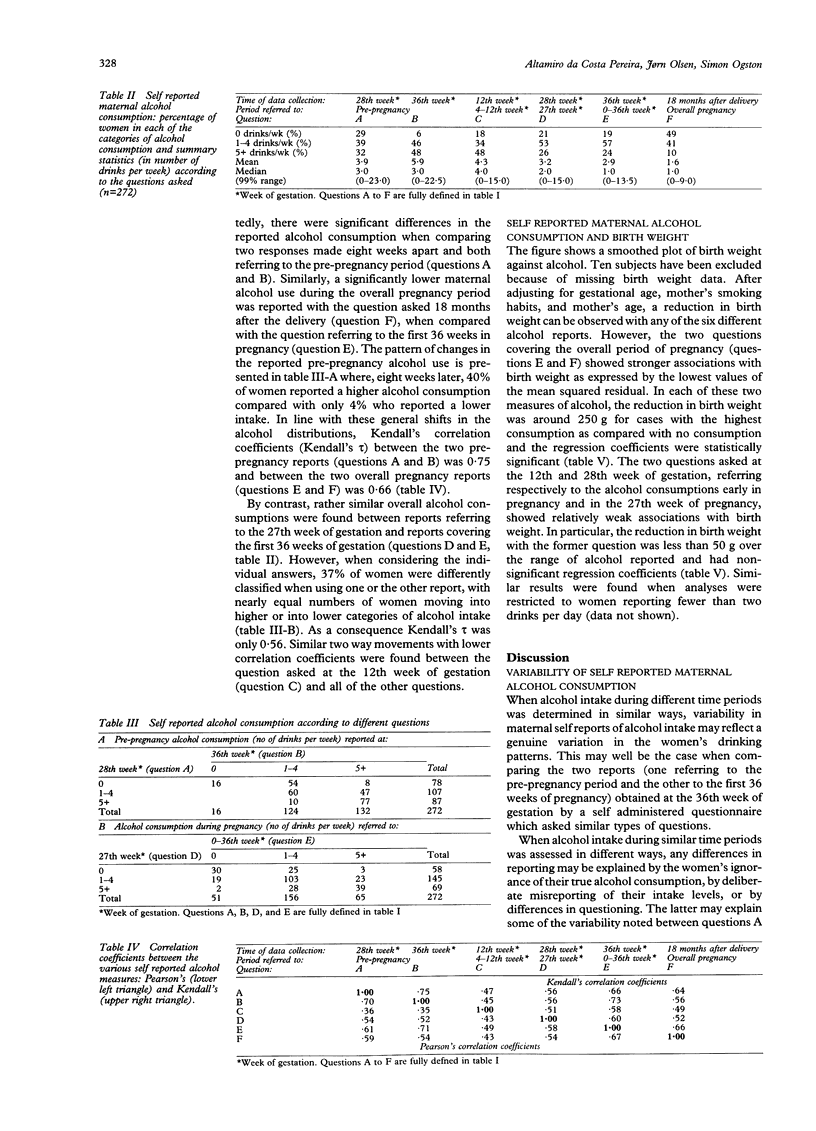
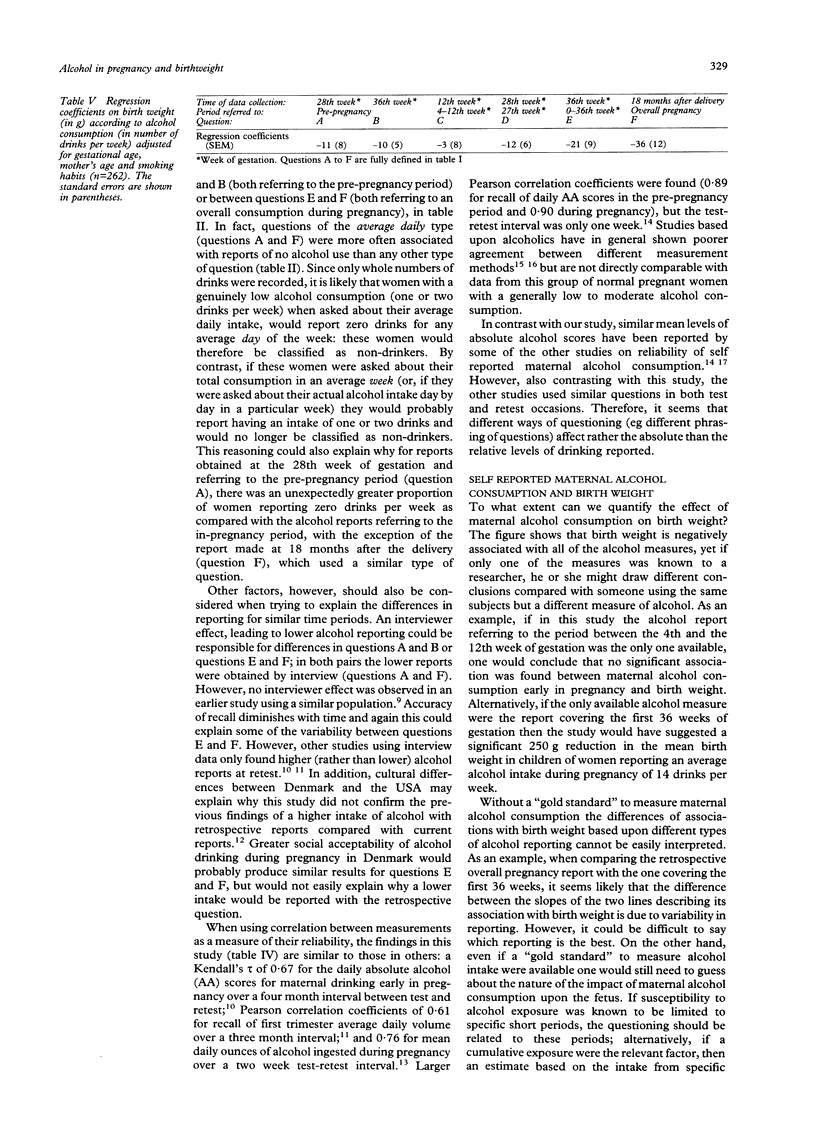
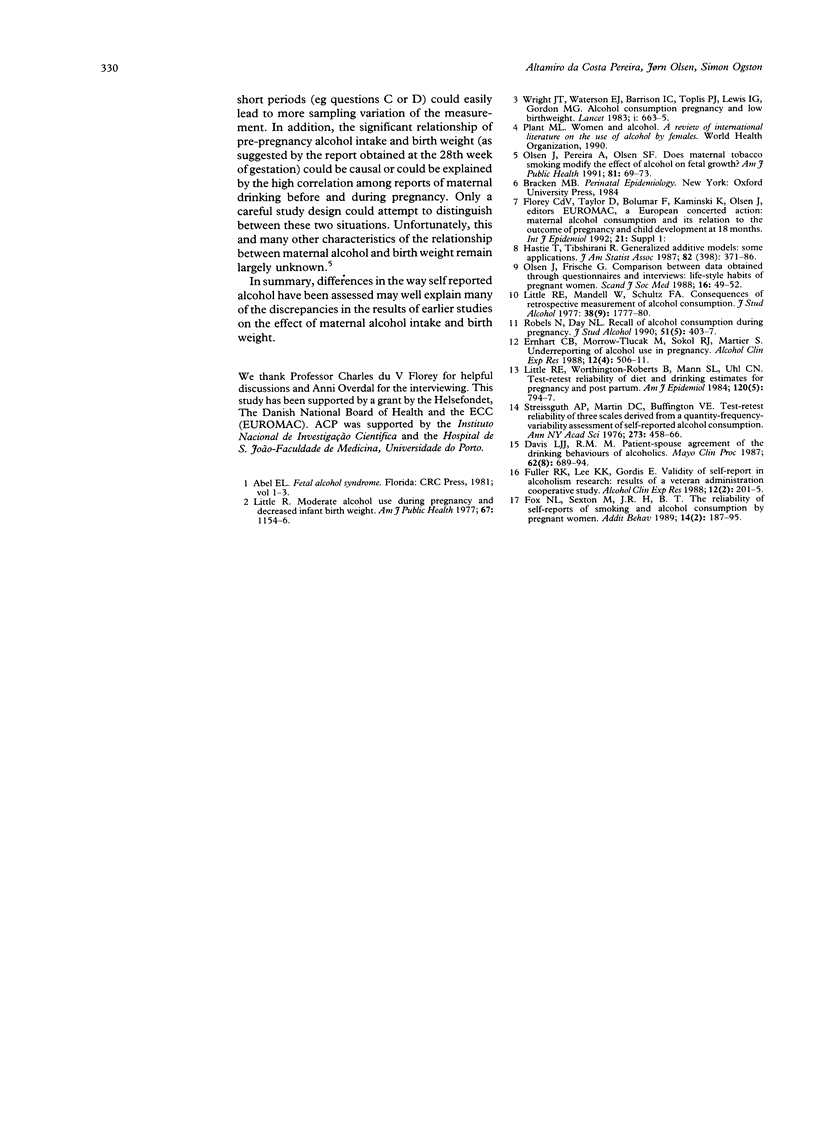
Selected References
These references are in PubMed. This may not be the complete list of references from this article.
- Davis L. J., Jr, Morse R. M. Patient-spouse agreement on the drinking behaviors of alcoholics. Mayo Clin Proc. 1987 Aug;62(8):689–694. doi: 10.1016/s0025-6196(12)65221-5. [DOI] [PubMed] [Google Scholar]
- Ernhart C. B., Morrow-Tlucak M., Sokol R. J., Martier S. Underreporting of alcohol use in pregnancy. Alcohol Clin Exp Res. 1988 Aug;12(4):506–511. doi: 10.1111/j.1530-0277.1988.tb00233.x. [DOI] [PubMed] [Google Scholar]
- Fox N. L., Sexton M., Hebel J. R., Thompson B. The reliability of self-reports of smoking and alcohol consumption by pregnant women. Addict Behav. 1989;14(2):187–195. doi: 10.1016/0306-4603(89)90047-6. [DOI] [PubMed] [Google Scholar]
- Little R. E., Mandell W., Schultz F. A. Consequences of retrospective measurement of alcohol consumption. J Stud Alcohol. 1977 Sep;38(9):1777–1780. doi: 10.15288/jsa.1977.38.1777. [DOI] [PubMed] [Google Scholar]
- Little R. E. Moderate alcohol use during pregnancy and decreased infant birth weight. Am J Public Health. 1977 Dec;67(12):1154–1156. doi: 10.2105/ajph.67.12.1154. [DOI] [PMC free article] [PubMed] [Google Scholar]
- Little R. E., Worthington-Roberts B., Mann S. L., Uhl C. N. Test-retest reliability of diet and drinking estimates for pregnancy and post partum. Am J Epidemiol. 1984 Nov;120(5):794–797. doi: 10.1093/oxfordjournals.aje.a113949. [DOI] [PubMed] [Google Scholar]
- Olsen J., Frische G. Comparison between data obtained through questionnaires and interviews: life-style habits of pregnant women. Scand J Soc Med. 1988;16(1):49–52. doi: 10.1177/140349488801600108. [DOI] [PubMed] [Google Scholar]
- Olsen J., Pereira A. da C., Olsen S. F. Does maternal tobacco smoking modify the effect of alcohol on fetal growth? Am J Public Health. 1991 Jan;81(1):69–73. doi: 10.2105/ajph.81.1.69. [DOI] [PMC free article] [PubMed] [Google Scholar]
- Robles N., Day N. L. Recall of alcohol consumption during pregnancy. J Stud Alcohol. 1990 Sep;51(5):403–407. doi: 10.15288/jsa.1990.51.403. [DOI] [PubMed] [Google Scholar]
- Streissguth A. P., Martin D. C., Buffington V. E. Test-retest reliability of three-scales derived from a quantity-frequency-variability assessment of self-reported alcohol consumption. Ann N Y Acad Sci. 1976;273:458–466. doi: 10.1111/j.1749-6632.1976.tb52916.x. [DOI] [PubMed] [Google Scholar]
- Wright J. T., Waterson E. J., Barrison I. G., Toplis P. J., Lewis I. G., Gordon M. G., MacRae K. D., Morris N. F., Murray-Lyon I. M. Alcohol consumption, pregnancy, and low birthweight. Lancet. 1983 Mar 26;1(8326 Pt 1):663–665. doi: 10.1016/s0140-6736(83)91964-5. [DOI] [PubMed] [Google Scholar]


